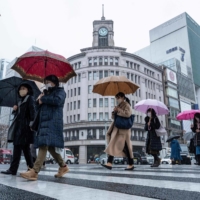The average winter bonus at large Japanese companies rose 8.92% from a year earlier to ¥894,179 ($6,800), marking the sharpest increase since the current calculation method was adopted in 1981, the country's most powerful business lobby said Thursday.
The Japan Business Federation, known as Keidanren, said the average winter bonus was the third highest, reflecting the recovery from the coronavirus pandemic, but it did not reach the level of the pre-pandemic year of 2019.
Of the 18 industries in the survey covering 162 major firms, average bonuses rose in 16 sectors this winter.
The average winter bonus in the nonmanufacturing sector increased 16.86% from last year to ¥832,082, larger than the 7.29% rise to ¥915,724 among manufacturers.
Steelmakers saw the sharpest increase, with winter bonuses up 87.23% to ¥1,017,895. The rise was due to cost reductions, such as steel mill closures and blast furnace shutdowns, and increased demand for steel as the economy started recovering.
As people have returned to the streets following the lifting of coronavirus restrictions, the bonuses in the commercial sector, including department stores and other retailers, increased by 27.18%, while the railway sector saw a 25.98% rise, according to Keidanren.
On the other hand, pulp and paper makers, as well as electric power companies, saw a decline, the business lobby said.
"The rate of increase certainly shows the bonus is recovering toward pre-pandemic levels," a Keidanren official said.
Following the increase in this year's average summer bonus, "The momentum for wage increase continues," the official added.




